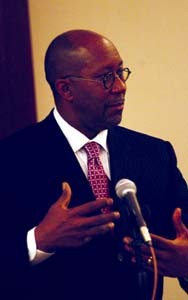
Kirk outlines career (Photo by John Schreiber, The Daily Campus)
As part of President Turner’s Leadership Summit, former Dallas mayor Ron Kirk spoke to students in attendance about his experiences in politics and how students can become good leaders.
President R. Gerald Turner introduced Kirk as “one of SMU’s real friends” and as a “leader in the Dallas community.”
Kirk first began by outlining his long journey into politics. As a child, Kirk’s parents were committed to the Civil Rights Movement. He remembered that taking part in the movement was not a choice, but a mandatory. Despite the influence of the Civil Rights Movement, Kirk wanted to be a lawyer more than a politician.
“I didn’t want to grow up to be a politician; I wanted to be a lawyer,” he said. “Primarily because of Thurgood Marshall.” At the time, Kirk believed that lawyers were changing the social setting through litigation rather than politicians.
After graduation from Austin College, a successful career as a lawyer, and time spent in Ann Richards’ administration, Kirk decided to run for Dallas mayor. His bid for mayor was successful and Kirk was mayor of Dallas for six years.
“If you win, you’re a genius. If you lose, all your friends say ‘what the hell were you thinking?’” he said. “Anybody in politics jumped — nobody pushed us.”
Instead of going with the mantra that Washington is run by too many politicians, Kirk used a different strategy in his campaigns.
“I thought that it might be unique to say ‘I know what I’m doing,’” he said. Meaning that he decided to run as a politician who claimed to be just that.
While serving as mayor, Kirk received only $50 per city council meeting.
“I never made more than $2,500 from the city,” he said.
After talking about his political background, Kirk offered the students in attendance advice on becoming a strong leader.
Kirk’s first piece of advice was for students to do something different and have a plan for what that different thing is.
“I think most leaders are ‘doers,’” he said.
He claimed that good leaders get people to follow them. Additionally, he said that real leaders are not afraid to get their hands dirty.
“Real passionate leaders have done anything you can do in a company,” he said.
The second thing Kirk looks for in a good leader is humility.
Specifically, people who are “humble enough to know what they’re good at and smart enough to know what they’re not good at.”
Aside from these to factors, Kirk said, “the most important thing is honesty and integrity — and energy.”
One of the questions Kirk fielded from the audiences was his take on America’s political landscape.
“One of the things that bothers me is that we live in a red and blue nation,” he said. “Nobody ever talks to one another.”
This mentality, according to Kirk, leads to useless bickering.
“You’d be stunned how differently you feel about something if you take eight hours to sleep on it,” he said. “Just sleep on it.”
Another way Kirk thinks useless bickering can be eliminated is if leaders surrounded themselves with people who kept them grounded.
“You’ve got to have somebody that can call bullshit on you,” he said.
Asked about the possibility of running for political office again, Kirk was unsure.
“I don’t know,” he said. “I’ve got the rest of my life to do politics.”
Two of the main reasons he is apprehensive to venture back into the political jungle are his daughters.
“I’ve got six years to watch those girls grow up into women,” he said.
Adding to the importance of his family, Kirk advised students to get some stability in their family and financial situation before going into politics.
“Get the stability in your life and then run,” he said.
On the issue of Laura Miller’s “strong mayor” proposal, Kirk isn’t sold on the idea.
“I just fundamentally believe in a manager,” he said. “You can’t fix a people problem by going back and changing the structure.”
Kirk said he is working with the Dallas City Council to come up with a hybrid, which he believes is the best solution for the issue.
Although, he has been out of the elected political arena for a few years, Kirk still sees ways Dallas can improve aside from the “strong mayor” proposal. One such change Kirk believes in is a better educational base in Dallas.
“The more educational infrastructure in a city, the better,” he said. He pointed to the fact that Dallas is the only city in North America without a state college or university in its corporate limits as proof. He also referenced Atlanta as a city that has a strong educational base.
Despite not holding a political office, Kirk has maintained a role in the big picture of Dallas’ future, and although Kirk is not sure whether he will ever run for political office again, it’s clear his interest in politics is still alive and well.









